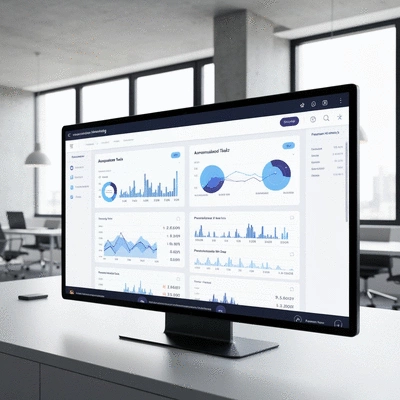Streamlining Marketing with AI Tools

With the rapid integration of AI tools into marketing strategies, small businesses can significantly enhance their operational efficiency. Have you ever wondered how these technologies can transform your marketing approach? Let’s delve into the key takeaways that showcase the immense advantages of AI automation for small businesses.
What You Will Learn
- AI automation frees up valuable time by handling routine tasks, allowing you to focus on strategic initiatives.
- Implementing AI tools enhances audience targeting through better data analysis and segmentation.
- Automation supports data-driven decision-making, enabling real-time adjustments to marketing strategies.
- AI enhances customer engagement by personalizing interactions, which fosters loyalty and satisfaction.
AI Automation's Impact on Marketing Workflow & Engagement
This visual illustrates how AI tools enhance marketing workflows, detailing key benefits and their role in customer engagement for small businesses.
How AI Enhances Marketing Workflow Efficiency
- ✓ Task Automation
- ✓ Data Analysis
- ✓ Personalization
Key Benefits of Implementing AI Marketing Automation
- ✓ Increased Efficiency
- ✓ Enhanced Targeting
- ✓ Cost-Effectiveness
Role of AI in Customer Engagement
- ✓ 24/7 Availability
- ✓ Data-Driven Insights
- ✓ Feedback Loops
Transforming Workflows with AI: Key Takeaways
- ✓ Streamlined Processes
- ✓ Predictive Analytics
- ✓ Resource Allocation
Significance of Audience Segmentation in Marketing
- ✓ Demographic Segmentation
- ✓ Behavioral Segmentation
- ✓ Psychographic Segmentation
Implementing AI Automation: Next Steps
- ✓ Assess Your Needs
- ✓ Research Options
- ✓ Trial Periods
Incorporating Analytics Dashboards for BI
- ✓ Performance Tracking
- ✓ Customer Insights
- ✓ Forecasting Trends
Understanding the Impact of AI Automation on Small Business Marketing
As a small business owner, I’ve seen firsthand how AI automation can completely transform marketing strategies. Imagine being able to streamline your workflow while enhancing overall efficiency! The integration of AI tools allows us to not only save time but also improve the effectiveness of our marketing campaigns. By automating repetitive tasks, we can focus on what truly matters: connecting with our customers and growing our businesses.
With AI, we can analyze data faster and make informed decisions that lead to better outcomes. For small businesses like mine, adopting these technologies means gaining a competitive edge in the ever-evolving digital landscape. So, how exactly do these AI tools enhance our marketing workflow?
How AI Tools Enhance Marketing Workflow Efficiency
AI tools streamline various processes that help us work smarter, not harder. Here are a few ways they do this:
- Task Automation: Automating routine tasks such as social media posting and email marketing frees up our time for more strategic endeavors.
- Data Analysis: AI takes the guesswork out of marketing decisions by analyzing customer data and providing actionable insights.
- Personalization: AI tools enable us to tailor our marketing efforts based on individual customer preferences, increasing engagement.
These enhancements lead to a more efficient marketing workflow, allowing us to allocate our resources better and focus on nurturing relationships with our customers.

Key Benefits of Implementing AI-Powered Marketing Automation
Implementing AI in our marketing strategy comes with numerous advantages that can’t be ignored. Here are some key benefits:
- Increased Efficiency: Automating tasks means we can accomplish more in less time.
- Enhanced Targeting: AI helps us identify and segment our audience more effectively, leading to campaigns that resonate.
- Cost-Effectiveness: By optimizing operations, we can reduce marketing costs while improving performance.
For small businesses like AI Marketing Insights, these benefits translate to more effective strategies that drive growth and foster customer loyalty. It’s all about working smarter, not just harder!
The Role of Artificial Intelligence in Customer Engagement
At the heart of any successful marketing strategy lies customer engagement. AI plays a pivotal role in how we connect with our audience. With tools like chatbots and personalized messaging, we can create meaningful interactions that build trust and rapport.
- 24/7 Availability: AI chatbots ensure that customer inquiries are addressed promptly, enhancing satisfaction.
- Data-Driven Insights: Understanding customer behavior through AI analytics allows us to craft more relevant content.
- Feedback Loops: AI tools can help us gather customer feedback in real-time, enabling continuous improvement.
By leveraging AI for customer engagement, we not only improve satisfaction but also foster long-term loyalty. This is a game changer for small businesses striving to remain competitive in today’s market.
Interactive Poll: Your AI Journey
We want to hear from you! As you consider integrating AI into your marketing strategy, what do you see as your biggest challenge?
Frequently Asked Questions About AI Automation in Marketing
What is AI automation in marketing for small businesses?
AI automation in marketing for small businesses involves using artificial intelligence tools to automate routine tasks, analyze data, personalize customer interactions, and optimize marketing campaigns to save time, improve efficiency, and enhance customer engagement.
How does AI help improve marketing workflow efficiency?
AI improves marketing workflow efficiency by automating repetitive tasks like social media posting and email marketing, providing data analysis for informed decision-making, and enabling personalization of marketing efforts based on customer preferences.
What are the main benefits of implementing AI marketing automation?
The main benefits include increased efficiency, enhanced audience targeting, and cost-effectiveness. AI allows businesses to accomplish more in less time, segment audiences more effectively, and reduce marketing costs through optimized operations.
How does AI enhance customer engagement?
AI enhances customer engagement by providing 24/7 availability through chatbots, offering data-driven insights into customer behavior for more relevant content, and creating feedback loops for continuous improvement and personalized interactions, which fosters loyalty.
What are the first steps a small business should take to implement AI automation?
Small businesses should first assess their specific needs to identify areas where AI can have the biggest impact, research available tools that align with their goals and budget, and utilize trial periods to test the software before making a commitment.
Summarizing the Advantages of AI Automation for Small Businesses
As we wrap up our exploration of AI automation, it's clear that the advantages for small businesses are substantial. By integrating AI tools, we not only streamline our marketing workflows but also enhance our overall efficiency. AI automation transforms the marketing landscape, making it easier for entrepreneurs to engage their audiences and optimize resources.
Here are some key takeaways that illustrate the value of AI automation:
- Increased Efficiency: Automating routine tasks frees up time for you to focus on strategic initiatives.
- Improved Targeting: AI tools enable more precise audience segmentation, helping you tailor your messaging.
- Data-Driven Decisions: Automation provides insights that allow for real-time adjustments and informed marketing strategies.
- Enhanced Customer Engagement: By leveraging AI, you can create personalized experiences that resonate with your audience.
These elements work together to create a more agile marketing approach. At AI Marketing Insights, we've witnessed firsthand how businesses can thrive when they adopt these innovative technologies!
Transforming Marketing Workflows with AI: Key Takeaways
When we look at how AI automation reshapes marketing workflows, several crucial aspects emerge. Firstly, the integration of AI tools can significantly reduce the manual labor involved in marketing tasks. This efficiency leads to faster campaign rollouts and improved responsiveness to market trends.
- Streamlined Processes: Automating repetitive tasks minimizes errors and saves time.
- Predictive Analytics: AI helps forecast customer behavior, enabling proactive marketing strategies.
- Resource Allocation: Businesses can allocate budgets more effectively by understanding which campaigns yield the best results.
These takeaways highlight how AI tools can fundamentally alter marketing dynamics for small businesses, allowing them to operate with greater agility and insight!
Exploring the Significance of Audience Segmentation in Marketing Strategies
Audience segmentation is a crucial aspect of any effective marketing strategy. By leveraging AI, businesses can identify specific customer segments and tailor their messaging accordingly. This not only enhances engagement but also drives conversions.
- Demographic Segmentation: Use AI to analyze age, gender, and location data.
- Behavioral Segmentation: Understand customer interactions and preferences through data analytics.
- Psychographic Segmentation: Explore values and lifestyles to create more personalized marketing messages.
As we look at these methods, it's evident that AI-driven audience segmentation allows for more targeted campaigns, resulting in better customer relationships and increased loyalty!

Taking the Next Steps: Implementing AI Automation
Exploring the Right Tools for Your Business Needs
As we move forward, choosing the right AI tools tailored to your business needs is essential. With a plethora of options available, consider what specific challenges you want to address. Are you aiming to enhance customer engagement, streamline marketing tasks, or improve data analytics?
- Assess Your Needs: Identify areas where automation can have the biggest impact.
- Research Options: Look for tools that align with your goals and budget.
- Trial Periods: Take advantage of free trials to test the software before committing.
At AI Marketing Insights, we encourage small businesses to explore tools that not only fit their current needs but also evolve with them!
Encouraging Trial and Evaluation of AI Marketing Solutions
Trying out AI marketing solutions can feel daunting, but it's a valuable step in your journey. The best way to determine if a tool is right for you is by testing it out in real-world scenarios.
- Start Small: Implement AI tools in a single campaign to gauge effectiveness.
- Monitor Performance: Use KPIs to evaluate the impact of AI on your marketing efforts.
- Gather Feedback: Encourage team input to refine your approach and improve outcomes.
Trial and evaluation not only provide insights but also build confidence in the technologies you choose to adopt!
Incorporating Analytics Dashboards for Real-Time Business Intelligence
Lastly, integrating analytics dashboards into your marketing strategy can provide vital real-time insights. These dashboards serve as a command center, allowing you to track performance metrics and make data-driven decisions.
- Performance Tracking: Monitor campaign success and adjust strategies as necessary.
- Customer Insights: Analyze customer behavior to refine your marketing tactics.
- Forecasting Trends: Use historical data to anticipate future developments and stay ahead of competitors.
By incorporating analytics dashboards, small businesses can harness the power of data to drive their marketing efforts effectively and efficiently!
Recap of Key Points
Here is a quick recap of the important points discussed in the article:
- Increased Efficiency: Automating routine tasks frees up time for strategic initiatives.
- Improved Targeting: AI tools enable more precise audience segmentation, helping tailor messaging.
- Data-Driven Decisions: Automation provides insights for real-time adjustments to marketing strategies.
- Enhanced Customer Engagement: Leveraging AI creates personalized experiences that resonate with your audience.
- Streamlined Processes: Automating repetitive tasks minimizes errors and saves time.
- Predictive Analytics: AI helps forecast customer behavior, enabling proactive marketing strategies.
- Resource Allocation: Understanding campaign effectiveness allows for better budget allocation.









